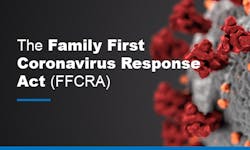DOL Changes FFCRA Rules to Meet Court Objections
The Department of Labor has issued new regulations governing the implementation of the Families First Coronavirus Response Act (FFCRA) after the original set of rules was overturned by a federal judge.
The new regulations are written in such a way as to overcome the largely procedural objections raised by the judge’s decision while making as few actual changes as possible. As a result, employers will need to meet many of the same standards as they did in the past.
The original rules went into effect on April 1 and the new rules are effective until the program expires on Dec. 31.
The revised regulations reinforce FFCRA’s work-availability and intermittent leave employer-approval requirements, narrow FFCRA’s health care provider exclusion and clarify when employees must provide documentation and notice supporting a leave request.
Here is a summary of the changes from attorneys for the law firm of McGuireWoods LLP.
The new temporary rule reaffirms the DOL’s work-availability requirement – that FFCRA leave is available “only if the employee has work from which to take leave.” As a result, the work-availability requirement remains in effect, such that an employee will be eligible for FFCRA leave only if the employer has work available.
If work is not available (e.g., due to circumstances such as a business closure due to a stay-at-home order), the employer need not offer FFCRA leave. “In making this change, DOL sought to avoid situations where an employer would be obligated to provide employees with paid leave after the employer had been forced to close its business operations or furlough workers,” the attorneys explain.
DOL reaffirmed its prior rule and supplemented its reasoning that intermittent FFCRA leave is available only upon an employer’s approval. Noting that undue disruption of an employer’s operations is potential grounds for denial of intermittent leave under the federal Family and Medical Leave Act (FMLA), DOL reasoned that requiring an employer’s approval for intermittent FFCRA leave similarly balances the interests of the employee and needs of the business.
The department further noted that health and safety concerns may be grounds for denial of intermittent FFCRA leave where time off in that form might “exacerbate the risk of COVID-19 contagion,” stating that “permitting such an employee to return to work intermittently when he or she is at an elevated risk of transmitting the virus would be incompatible with Congress’ goal to slow the spread of COVID-19.”
DOL amended the medical documentation requirement to permit employees to provide documentation “as soon as practicable” instead of “prior to” taking FFCRA leave. Similarly, the DOL clarified that while advance notice is not required for paid sick leave under the law, notice may be required “as soon as is practicable” for paid emergency FMLA leave under FFCRA (i.e., when caring for a child whose school or place of care is closed or child care provider is unavailable for reasons related to COVID-19).
According to DOL, this would “generally mean providing notice before taking leave” given that such time off is likely foreseeable.
DOL also narrowed the definition of “health care provider” under FFCRA in response to the judge’s ruling, which held that such exclusion was overbroad.
The revised definition includes only employees who meet the health care provider definition under the FMLA, or are employed to provide “diagnostic services, preventative services, treatment services or other services that are integrated with and necessary to the provision of patient care,” which, if not provided, would adversely impact patient care.
Previously, the DOL interpreted the health care provider exclusion to include, among other things, “anyone employed at” any doctor’s office, hospital, health care center, clinic, medical school and other listed entities “where medical services are provided.”
Under the new regulation, “a person is not a health care provider merely because his or her employer provides health care services or because he or she provides a service that affects the provision of health care services.” For example, per the DOL, “IT professionals, building maintenance staff, human resources personnel, cooks, food services workers, records managers, consultants, and billers are not health care providers, even if they work at a hospital of a similar health care facility.”
“With FFCRA scheduled to expire Dec. 31, 2020, it is unknown whether the DOL’s revised regulations will be subject to or withstand further judicial scrutiny,” the McGuireWoods attorneys warned. “In the meantime, covered employers may rely upon the revised regulations, bearing in mind that there may be further challenges.”
About the Author

David Sparkman
David Sparkman is founding editor of ACWI Advance, the newsletter of the American Chain of Warehouses Inc. He also heads David Sparkman Consulting, a Washington, D.C. area public relations and communications firm. Prior to these he was director of industry relations for the International Warehouse Logistics Association. Sparkman has also been a freelance writer, specializing in logistics and freight transportation. He has served as vice president of communications for the American Moving and Storage Association, director of communications for the National Private Truck Council, and for two decades with American Trucking Associations on its weekly newspaper, Transport Topics.
